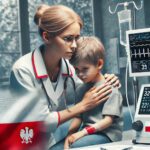Source: Velvin, G., Johnsen, V., Lidal, I. B., & Berg, E. (2023). Parental Intervention Program for Preschool children with Rare Diseases – a mixed methods evaluation of parents’ experiences and utility. Orphanet Journal of Rare Diseases , 18(327). https://doi.org/10.1186/s13023-023-02935-8
What’s new: Norway’s Parental Intervention Program for Preschool Children with Rare Diseases (PIPP-RDs) has been shown to be effective in preparing and supporting parents during their child’s transition from kindergarten to school.
Why it matters: 🎓 Parents play a crucial role in the educational transition of children with rare diseases. Participation in PIPP-RDs increased parents’ health literacy, improving school-home collaboration and reducing stress during the transition.
The big picture:
- Around 72% of rare diseases have a genetic origin, with 70% of them beginning in childhood.
- PIPP-RDs focuses on increasing the health literacy of parents, preparing them for the specific educational challenges of children with rare diseases.
- Research indicates that similar programs improve parents’ self-efficacy and involvement in their children’s school education.
The article in questions and answers
What are the study’s main conclusions regarding parents’ experiences and perceptions of participating in rare disease research?
The main conclusions of the study regarding parents’ experiences and perceptions of participating in rare disease research are as follows:
- All the parents who took part in the study said that the information presented during the Parental Intervention Program for Preschool Children with Rare Diseases (PIPP-RDs) was very useful for the transition process.
- A high percentage (88%) of parents found the program very useful for relieving stress related to their children starting school and 84% found it very useful for school-home collaboration.
- Although 44% of parents found it very useful for increasing their knowledge of their children’s needs, 50% found it useful and 5% weren’t sure.
- All the parents reported that the PIPP-RDs met their knowledge and information needs, and 88% found it easier to inform others about their children’s illnesses after attending the program.
- 84% of parents initiated contact with their schools because of the information they received and 88% reported that this made it easier to inform others about their children’s needs.
- All parents would recommend PIPP-RD to other parents of children with rare diseases and would emphasize the benefit of meeting other parents.
These conclusions highlight the positive impact of parental intervention programs in rare disease research and the importance of providing support and information to parents of children with rare diseases.
What is the significance of the data provided in this article and how does it contribute to the field of rare disease research?
The data provided in this article and its contribution to the field of rare disease research is significant for several reasons:
- Parental Perspective: The study provides valuable information about the experiences and perceptions of parents of children with rare diseases who participate in a Parental Intervention Program. Understanding parents’ perspectives is crucial to developing effective support programs and interventions tailored to their needs.
- Health Literacy: By evaluating the elements of the Parental Intervention Program that parents emphasized as important for improving their health literacy, the research sheds light on the specific factors that can improve parents’ understanding of their children’s rare diseases. This knowledge can lead to better health outcomes and better management of the transition process from kindergarten to school.
- Ethical Considerations: The study’s adherence to ethical guidelines, including obtaining informed consent from participants and ensuring data protection, demonstrates a commitment to conducting research responsibly and respecting the rights and privacy of individuals involved in rare disease studies.
- International Collaboration: The article highlights the potential for international collaborative studies using similar intervention programs for parents of children with rare diseases. Collaborations of this nature can improve knowledge sharing, promote best practices and ultimately improve outcomes for families affected by rare diseases on a global scale.
- Open Access: The use of a Creative Commons Attribution 4.0 International License for the article promotes open access to the research results, making them freely available to researchers, health professionals, policymakers and the public. This accessibility facilitates a wider dissemination of knowledge and promotes collaboration in the field of rare disease research.
Overall, the data presented in this article not only enriches our understanding of the challenges faced by families affected by rare diseases, but also offers valuable information that can inform the development of effective interventions, support programs and collaborative initiatives to improve the lives of rare disease patients. rare diseases and their families.
Source: Velvin, G., Johnsen, V., Lidal, I. B., & Berg, E. (2023). Parental Intervention Program for Preschool children with Rare Diseases – a mixed methods evaluation of parents’ experiences and utility. Orphanet Journal of Rare Diseases , 18(327). https://doi.org/10.1186/s13023-023-02935-8
Este post também está disponível em: Português (Portuguese (Brazil))






